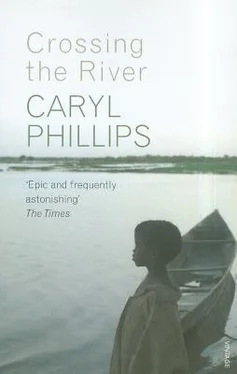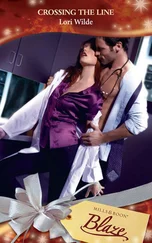Caryl Phillips - Crossing the River
Здесь есть возможность читать онлайн «Caryl Phillips - Crossing the River» весь текст электронной книги совершенно бесплатно (целиком полную версию без сокращений). В некоторых случаях можно слушать аудио, скачать через торрент в формате fb2 и присутствует краткое содержание. Год выпуска: 2006, Издательство: Vintage, Жанр: Современная проза, на английском языке. Описание произведения, (предисловие) а так же отзывы посетителей доступны на портале библиотеки ЛибКат.
- Название:Crossing the River
- Автор:
- Издательство:Vintage
- Жанр:
- Год:2006
- ISBN:нет данных
- Рейтинг книги:4 / 5. Голосов: 1
-
Избранное:Добавить в избранное
- Отзывы:
-
Ваша оценка:
- 80
- 1
- 2
- 3
- 4
- 5
Crossing the River: краткое содержание, описание и аннотация
Предлагаем к чтению аннотацию, описание, краткое содержание или предисловие (зависит от того, что написал сам автор книги «Crossing the River»). Если вы не нашли необходимую информацию о книге — напишите в комментариях, мы постараемся отыскать её.
Crossing the River — читать онлайн бесплатно полную книгу (весь текст) целиком
Ниже представлен текст книги, разбитый по страницам. Система сохранения места последней прочитанной страницы, позволяет с удобством читать онлайн бесплатно книгу «Crossing the River», без необходимости каждый раз заново искать на чём Вы остановились. Поставьте закладку, и сможете в любой момент перейти на страницу, на которой закончили чтение.
Интервал:
Закладка:
9 MAY 1945
Churchill spoke at three p.m. He called it the people’s victory, but we all knew it was his. Churchill’s. At the end of his speech, there was loud cheering. Everybody spilled out into the street to enjoy the two days of holiday. The bunting meant something now, as did the Union Jacks and the portraits of Winnie. We had won the war. I put my hair up in a wrap and stepped out to join them. I held Greer and watched as they put on hats and sang. Then they danced the hokey-cokey and swilled down dandelion and burdock and ginger beer. I’d done my bit. I’d supplied them with their food. Some went off to church. The bells were ringing again. I hoped that at least one of them might remember Sandra. Others lit a bonfire, and on to it went army forms, and ration books; anything to do with the war. And there was a crude effigy of Hitler. That burned quickly. At nine p.m., the King made a speech in his usual stammer. I’d never had much time for these people, but it was moving. Some of them even spoke to me and smiled at Greer. Just before midnight, I took him inside, out of the evening chill.
1963
It was nearly four o’clock. I stared at Greer and longed for him to stay as dearly as I longed for him to leave. I’d explained that I thought he should go before the children came back. He said he understood. The silences had become more awkward, but at least they remained free of accusation. A handsome man. Yes, a man. No longer a baby. Or a boy. He got to his feet. I knew he would never call me mother. He could go, but would he come back? It wasn’t for me to ask him. I hadn’t asked him here in the first place. For eighteen years I hadn’t invited him to do anything. Not since the lady with the blue coat and maroon scarf. With her tiny dog named Monty. She was so wet you could pour her into a jug. My GI baby. No father, no mother, no Uncle Sam. It must go into the care of the County Council as an orphan, love. If you’re lucky, it might be legally adopted into a well-to-do family. Some are, you know. For weeks afterwards I wandered around the park looking at women pushing their prams. Their awkward babies screamed as though they’d tumbled straight from the womb and into these contraptions. For eighteen years I hadn’t invited Greer to do anything. Your father and I, Greer. We couldn’t show off. We had to be careful. And bold. We started a dance once. My God, I remember that. And for weeks afterwards, every time I thought of him I was sure my knees were going to give way. Then, later, they took him away from me, to Italy. I’d go to the cinema in the hope of seeing him. But they just showed the Tommies. Never the Yanks. And if they did, never the Coloureds. I once got two letters from him on the same day, and I didn’t know which one to open first. And then he came back on New Year’s Day, 1945. For the wedding. And now, I don’t even have a picture of him. I’m sorry, love. I destroyed everything. Letters, pictures, everything. When I met Alan. It seemed the right thing to do, but I was stupid. He spoke again. I’d better go now, he said. My God, I wanted to hug him. I wanted him to know that I did have feelings for him. Both then and now. He was my son. Our son.
NEW YEAR’S DAY, 1945
He came back on compassionate leave. The doctor had said I was having a breakdown and a baby. Just seventy-two hours, that’s all they’d given him, then he’d have to go back. I went down to town to meet him, but I nearly wept when I saw him getting off the train. He looked as thin as a door, and so tired. He didn’t have that bounce in his step. He didn’t have any joy in his face. Everybody stared at him. I think they must have felt sorry for him, bending under the weight of that bag on his back. He looked like the saddest man in the world. Even before I’d fallen pregnant, he’d asked me if we could get wed. At first I thought it was only the war talking, but eventually I told him yes, as soon as I was rid of Len. Maybe I was a bit worried that he’d leave me behind after the war. He’d already told me that we couldn’t live together in America. It wouldn’t be allowed. I thought getting wed would be a way of keeping him here. In England. As he walked towards me along the black length of the platform, with that slow stride and those hunched shoulders, I could see just how shattered he was. He had huge bags under his eyes, and he hadn’t shaved for days. And then he saw me, and the child pushing at my coat. He stopped and stared. I could feel myself colouring over. And then he came right up to me, and I started to cry. The doctor was right, my nerves wanted building up. He let his bag fall to the platform. Joyce. That was all he said. Just, Joyce. I could see now, the gap in the middle of his teeth. At the bottom. And then he reached out and pulled me towards him. I couldn’t believe it. He’d come back to me. He really wanted me. That day, crying on the platform, safe in Travis’s arms.
1945
I stood there in that freezing room, the eyes of the two unknown witnesses staring at my back, Travis at my side, my belly out in front of me, wishing the Registrar would just hurry it up a bit. He had this thin smile painted across his mouth, and there was something about him that I truly disliked. When I came to make the appointment, he told me that he’d done one other GI bride’s wedding. I didn’t tell him that he’d not have done one like this, though. After the divorce came through, I’d written to Travis in Italy and told him. He wrote back and told me that he’d got his commanding officer’s permission, as long as he didn’t try and take me back to America with him. They weren’t having any of that. Me, I wasn’t right over there. After I got his letter, I went to the Registrar and made an appointment. He told me that he’d done one other GI bride’s wedding.
1945
Nobody said anything, but when they lifted him clear of my body and began to towel him down, I knew what they were thinking. I stared at him. My beautiful son. The nurse placed him in my arms. He’s like coffee, isn’t he, love. I had no idea then that his father would never see him. Later, after I’d got the telegram, after the war was over, the lady with the blue coat came to visit. I could see her looking at me and thinking, poor disillusioned cow. You’ll be better off, love, with somebody else looking after him. Trust me. I know what I’m on about. I mean, how are you going to cope? You won’t know what to do now, will you. Let’s be sensible. You’re going to have to start a new life on your own. And so we were sensible, my son and I. My son who hadn’t asked me to turn him over to the lady with the blue coat and maroon scarf.
1945
The Red Cross man knocked once. Then again, impatiently. Hardly gave me time to set Greer right and get down the stairs. I opened the door and he handed me the telegram. I didn’t have a chance to say much of anything. He just smiled slightly and began to back away. I closed in the door. The telegram didn’t say much. I had to try to imagine it. To die at first light on the Italian coast. Fear. Mud. Shivering cold. Noise. Silence louder than any noise. Mortar fire. A bullet. A young man screaming in pain, shouting out for mercy to a God he no longer believed existed. His flesh ripped open by hot, flying metal. A man with blood flowing like red wine from his open veins. In a strange country. Among people he hardly knew. I remembered what my mother had said to me when I told her that I was getting married. At least you’re not getting wed to a soldier, she’d said. You should never do that, for you’ll just be left on your own. I closed the shop. I didn’t open up for three days. On the second day, two of them came to see me. They’d heard. They asked me if there was anything they could do. No, I said. Thank you, but no. After the telegram, I tried not to be angry. I knew everything was going on around me like normal. People were still having their usual at the pub. They were still going off to work the next morning. I was the only one who’d lost anything. They’d lost nothing. Just been inconvenienced a bit by this war. We hadn’t even been bombed in this bloody stupid village. I wanted to break something. I really wanted to smash something to bits. The following month it was all over. I put my hair up in a wrap and stepped out to join them. I held Greer and watched as they put on hats and sang. Then they danced the hokey-cokey. I’d done my bit. I’d supplied them with their food. Some went off to church. The bells were ringing again. I hoped that at least one of them might remember Sandra. Others lit a bonfire, and on to it went army forms and ration books; anything to do with the war. And there was a crude effigy of Hitler. That burned quickly. At nine p.m. the King made a speech in his usual stammer. I’d never had much time for these people, but it was moving. Some of them even spoke to me and smiled at Greer. Just before midnight, I took him inside, out of the evening chill. A week later she turned up. The lady with the blue coat. With her dog, Monty. And Len was back. He wanted his shop. I had no money. Nothing. Only Greer. She said, You’re going to have to start a new life on your own. And so we were sensible, my son and I. Into the care of the County Council as an orphan, love. It hadn’t really dawned on me, but it was true. His father would never see him. Never. I left the village, the shop, my ex-husband, and went to live back in the town. On my own. For weeks afterwards, I wandered around the park looking at women pushing their prams.
Читать дальшеИнтервал:
Закладка:
Похожие книги на «Crossing the River»
Представляем Вашему вниманию похожие книги на «Crossing the River» списком для выбора. Мы отобрали схожую по названию и смыслу литературу в надежде предоставить читателям больше вариантов отыскать новые, интересные, ещё непрочитанные произведения.
Обсуждение, отзывы о книге «Crossing the River» и просто собственные мнения читателей. Оставьте ваши комментарии, напишите, что Вы думаете о произведении, его смысле или главных героях. Укажите что конкретно понравилось, а что нет, и почему Вы так считаете.












